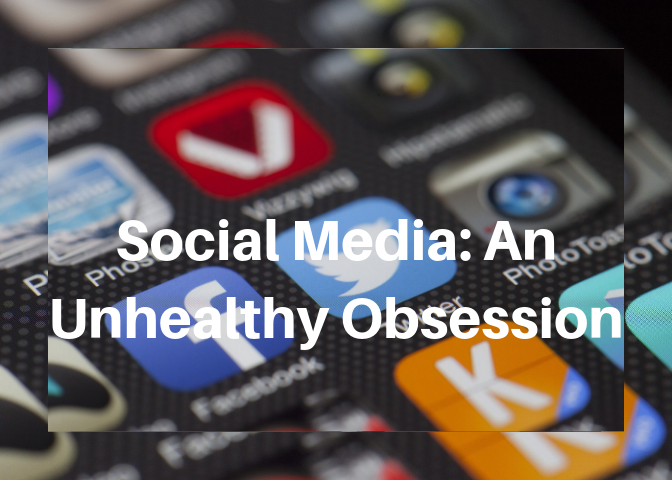Social Media: An Unhealthy Obsession
Raise up your horizons
September 11, 2019
I’m doing this and you’re not. This message underlies a large portion of all teens’ and young adults’ posts on social media whether anyone wants to admit it or not.
After two decades, social media has fully cemented its place in our world as us teens and young adults do not know life without it. The digital world has consumed our lives as we obsess over likes, followers, and how we can present what we believe to be the best parts of our lives and hide what we don’t want others to see, even if that means hiding our true selves. As a result, people are no longer present in reality because our minds are tied down to a digital world where we receive hours of stimulation every day from content that adds little to no benefit to our lives.
Sure, now we can follow our favorite bands, athletes, or celebrities closer than ever. But that’s not where the problem lies. The problem is that people believe that they are defined by their social media profiles, and that the content they view and post each day is something they can’t live without.
This harmful addiction is ubiquitous among high schoolers. If you peer into the cafeteria, you will see herds of students scrolling through their phones and ignoring the presence of their friends. And if you look into a classroom, there will always be at least a couple kids who feel the need to covertly Snapchat a picture of a portion of their face under their desk during a lecture.
As a result of these smartphone and social media addictions, our generation is incapable of being bored. Whenever anyone has five to ten minutes to spare, they instinctively pick up their phone and start texting, Snapchatting, or scrolling through Instagram. Add those quick spurts with the extended period of time that we already block off for social media, and you’re looking at a pretty hefty amount of screen time.
And because almost all of our free time is consumed by social media, no one has hobbies anymore — wait a second, don’t teens not have hobbies anymore because of the ‘incredible workloads’ of school and extracurriculars? The internet has increased educational opportunities and the increased pressure on receiving a college education has caused slightly more to be expected of high schoolers. However, this is not enough to consume all of our free time. Sports, extracurriculars, and school just so happened to exist when our parents were in school, and hobbies were prominent up until millennials started to grow up, so where has this time magically gone? Well, for most, this time is consumed by, you guessed it, social media.
We always hear about the collapse of our attention spans. First, it’s hard to get much done when we constantly peer over to our phone to hope some notification pops up, or when we take a break every fifteen minutes to Snapchat or check Instagram or some other network.
Next, our minds are constantly wondering what’s happening in these worlds or how people are reacting to our latest post because we think this content is crucial to our lives. Believe it or not, but you’ll be just fine if you didn’t look at a couple funny memes or what one of your friends is having for lunch each day. Maybe instead of succumbing to the urge to pick up your phone, pick up a book, or you could even just ignore it and do nothing. Maybe instead of filming the next concert you go to and uploading it to Snapchat, you just actually enjoy it and soak it in. It’s okay to live in the moment and block out the outside noise.
Then there are the downsides of the content of each network. Mental health awareness has grown tremendously of late, and while that is great, it mainly has arisen from social media creating a bubble of insecurity around our lives. When someone posts a picture to Instagram or Snapchat, they subject themselves to scrutiny. Maybe no one even takes the time to judge the photo as they mindlessly scroll through an endless stream of posts. It doesn’t matter, it’s too late. The poster is already worrying about what their followers think.
What do they think?
Do I look good enough in this photo?
Why does it matter what they think? And what was the motivation behind posting the picture? What does someone achieve when they release a post to all of their followers, many of whom they rarely, if ever, interact with? I guess people need to feel the gratification of loads of comments complimenting them even though most of the comments have little to no genuine sentiment behind them from people they barely know. If something is so important, it should be shared privately with one’s friends, the people who would legitimately care. But by deciding to post whatever altered presentation of their life they want to, they are just inviting criticism and thus anxiety.
People now believe that they are conveying their true personality through their social media accounts. If a person can get to “know us” through a dozen or so pictures, then we have lost all depth and meaning as a society. We are not expressing ourselves as much as we are confining ourselves through these platforms. When someone posts a picture of themselves vacationing on a beach, they are telling the world of their experience in the most ideal way. However, they don’t post about the family bickering or any other negative components of the trip, because their goal is to present their life in the most “amazing” way and to make others jealous even if it means presenting some altered fantasy. You can’t adequately express the impact of an experience, either negative or positive, through a post. Actual human interaction cannot be replaced.
Social media confines us to a collection of images or posts, and provokes anxiety of what others think about us. Yes, we can communicate faster than ever with essentially anyone, but that is just a small part of how it is used among teens. Our time could be spent on better things than worrying about what other people are doing or what they think of us. Go outside, talk to somebody, read a book, find what makes you happy, and live in the moment. Be an individual, because some account is not what defines us. Society functioned for all but the last two decades without social media, so, as crazy as it sounds, these platforms are not an essential part of our lives. Stop with the phony internet persona, and just be yourself.







